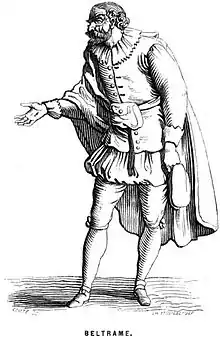Beltrame
Beltrame (in Milanese: Baltramm) is a traditional character of the Italian commedia dell'arte associated to the city of Milan, and dating back to the 16th-17th century or earlier.[1] It is also often referenced by the full name Beltrame di Milano[1] and also as Beltrame di Gaggiano (from the borgo - now a comune - of Gaggiano, in the surroundings of Milan) or Beltrame de la Gippa (where the "gippa" is the large blouse, or tunic, worn by the character).[2]

The creation of Beltrame character is sometimes credited to Niccolò Barbieri. In any case, Barbieri largely contributed to the popularity of the character with plays such as L'inavvertito.[3] Barbieri was an actor as well as a comedian, and assumed the role and stage name of Beltrame himself.[4] His character is a usually a crafty, astute villager and husband[2] and blunderer, always trying to appear of higher rank than he really is;.[5] He took on several different roles, including that of the merchant and of Colombina's father trying to force his daughter into a marriage of convenience (a part he shares with Tabarino).[6] He often reaches his goals in virtue of his lack of scruples, astute rhetoric, and mock good manners.[6] His costume, resembling that of a 16th-century servant, included a large tunic, a purse, and a dagger.[7]
Beltrame has long been the main representative of Milan in the commedia, although this role was later taken on by Meneghino. It is also often described as a variation of character Brighella (associated to the city of Bergamo, and sometimes also to Milan),[8] or even as Brighella's brother.[9]
Beltrame has inspired Moliere's character Mascarille, from the comedy L'Étourdi ou Les Contretemps (The Blunderer, 1655).[3]
Footnotes
- Beltrame di Milano
- The Commedia dell'arte Archived 2012-03-20 at the Wayback Machine
- The Blunderer
- See P. L. Duchartre, The Italian Comedy, p. 32
- Meissen and the Commedia dell'arte Archived July 7, 2011, at the Wayback Machine
- Beltrame Archived 2018-02-01 at the Wayback Machine
- See P. L. Duchartre, The Italian Comedy, p. 154
- Brighella
- See P. L. Duchartre, The Italian Comedy, p. 39